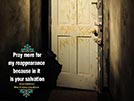Istikhara: Seeking Divine Guidance
- Details
- Hits: 1066

We have been asked to rely on Allah and His Divine messenger to have ‘Tawakal’ and keep on praying for what have been made permissible and just for us. However, sometimes, we have to take certain decisions, which may have good or bad outcome and may have significant impact on our lives at later stages. In addition, one would also like to have Divine blessings for his/her action, no matter how important or unimportant these are. For these reasons, we have been advised by Masomeen (A.S) to first carefully analyze the situation and then have consultation with wise and trustworthy brothers-in-faith and preferably seek Divine guidance through supplications and Istikhara.
It is narrated from the commander of the faithful (Amir-ul-Momineen) (A.S) that whoever does not seek advice from others and acts on his own judgment, frequently risks being caught in turmoil. The commander of the faithful (Amir-ul-Momineen) (A.S) also warned and admonished those who would not give a good piece of advice to fellow Muslims even though they are aware of the facts related to the asked issues [Tahzib-ul-Islam, Allama Majlasi, U, pp.464].
To Whom One Should Consult?
It is narrated from Imam Jafar-e-Sadiq (A.S) that sometimes there is more harm in consultation than the benefits if certain rules regarding consultation principles are not followed, the person one should consult may belong to one of the followings: 1- be a wise person; 2- be impartial and righteous and 3- be a brother-in-faith and a trustworthy friend and finally give him all the information, as much as you know, so that he may review and assess all aspects (before advising you) and then do not disclose his advice to others. The benefits of acting on these rules would be that if he is a wise person then you will benefit from his knowledge and expertise, if he is impartial and righteous then he will justify the effort and thinking required in finding you a good solution, if he is your brother-in-faith and sincere friend then he will not reveal your secrets to others.
To whom one should not consult!
It is narrated from Rasool Allah (P.B.U.H&H.P) do not consult with a spineless and timid person as he will make your easy escape difficult, from the calamities in front of you, misers and stingy would stop you from doing any good and reaching your goals and objectives and do not consult with greedy and avaricious (who would do anything for money) as they will recommend and praise the worst possible options [Tahzib-ul-Islam, Allama Majlasi, U, pp.465].
Once we pass these stages and come to a stage when we have to finalize our course of action then it is recommended by Masomeen (A.S) to seek Divine guidance, e.g., whether to perform an act or rather wait for another time? This final consultation is called Istikhara and may only be seeking for those things, which are under one’s control to act/adapt or decline. Similarly, Istikhara may be performed on behalf of someone else, if one makes such a request.
For What Matters One May Take Istikhara?
Istikhara may be taken on anything, which one has under his jurisdiction, excluding those matters, which are related to what would happen in the future, or how, and what someone else would react/do. Seeking advice of fortunetellers, palm-readers or any other ‘Amal’ apart from supplications as per traditions of Masomeen (A.S), are certainly forbidden. One would also not take Istikhara on certain matters which, although are permissible and belong to present but for some reasons outside one’s powers, e.g., if one has no money and there is a request for a loan from a fellow brother then he has no option but to decline the loan request. Similarly matters related to compulsory/permissible (Wajib/halal) non-permissible (Harram) are also outside the scope of Istikhara. Those matters which are within one’s means and are permissible under Islamic law are therefore, the ones for which Istikhara is Mustahib, regardless of their value/importance, e.g., issues from buying or selling a house/car to going for a hair cut or buying a pair of shoes. As per the traditions of Masomeen (A.S).
Imam Abi Abdullah per would seek guidance from Allah whenever Imam has an intention of buying or selling something, from slaves or animals or the less valuable items or less effort requiring tasks. And would make supplications to Allah (S.W.T) (before taking Istikhara) seven or one hundred times, depending on the seriousness of an issue [Bihar-ul-Anwar-Vol-88.Page-280].
Abu Abdullah said: When, among the slaves of Allah sought guidance, Allah sends good to him. So keep on praying for a better solution, even if it exceeds seventy times while sending Salawat on Mohammed and Aly Mohammed [Bihar-ul-Anwar Vol-88.Page-282].
The Best Way to Perform Istikhara?
It is narrated from Imam al-Jawad per: `It is best that you seek the best (from Allah (S.W.T)) after a two rakat Salat. In another tradition, it is also recommended; perform bath (Ghusal) prior to taking out istikhara [Fath al-Abwab, Page 143 / Wasa'il ash-Shi'a, Volume 8, Pp 77].
The One Who Ignores the Istikhra or its Result!
Once Imam al-Sadiq (A.S) was asked: "Who is the worst creation in the eyes of Allah?" The Imam (A.S) replied, "The one who stages an accusation against Allah (S.W.T). The person asked again, "Is it possible for a person to come up with an accusation against Allah (S.W.T)?" Imam (A.S), replied, "Yes. The one who asks Allah for the best and when (the best) is given to him but he does not like what is given to him, and he becomes upset. Thus, this is the one who has staged an accusation against Allah (S.W.T) [Al-Mahason, vol 2, pp. 598].
Taken from: Hub-e-Ali.com











